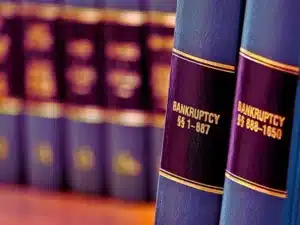
Can Student Loans Be Discharged in Chapter 7
People with student loans and experiencing serious financial constrains may ask: can student loans be discharged in Chapter 7? You can discharge student loans by filing Chapter 7 bankruptcy. It is, however, an arduous task. You must demonstrate undue hardship, the inability to maintain a minimal living standard, to better the chances of your student loans getting discharged. Reviewing the loan’s grace period, consolidating the loan, or enrolling in an income-driven repayment plan are some alternatives to student loan discharge.

What Is Chapter 7 Bankruptcy?
Chapter 7 bankruptcy allows you to sell your nonexempt possessions and use the sale proceeds to repay your creditors. Nonexempt property is not protected in bankruptcy and can include bank account funds, vehicles, second homes, expensive clothing, and retirement accounts. This type of bankruptcy allows you to keep exempt possessions and assets, like pensions, insurance, household goods, and wages, up to a limit.
You can consider filing a Chapter 7 bankruptcy when meeting your current financial obligations is hard. You can do this to discharge certain debts, preventing creditors from demanding you to pay the debts. A Nevada bankruptcy court must, however, review the case before granting the discharge.
The court will automatically place a temporary stay on your debts once you file Chapter 7 bankruptcy. The stay helps stop creditors from attempting to collect debt. It also stops home foreclosure, utility turn-off, eviction, property repossession, and wage garnishment.
Afterward, a court-appointed trustee will take and sell your nonexempt property. The trustee will review your finances before taking this step. The trustee will use the proceeds from the sale to pay off unsecured debts that cannot get discharged.
A Chapter 7 bankruptcy allows you to keep exempt property. The court discharges all other debts or financial obligations. A
Eligibility for Chapter 7 Bankruptcy
You must complete a credit counseling course from a recognized counseling agency 180 days before filing for Chapter 7 bankruptcy. The average monthly income in the past six months must be below the median income for a household of the same size in your state.
Alternatively, you can undertake a means test to determine if your disposable income is high enough to allow them to pay your unsecured debts partially. You can file a Chapter 13 bankruptcy if you fail the means test.
If you pass the test, you must prove that you have not filed Chapter 7 bankruptcy in at least eight years or Chapter 13 in the past six years. You must wait 181 days to file Chapter 7 bankruptcy if you recently filed any of these bankruptcies, but the case got dismissed.
Under Nevada law, debtors can only be eligible for Chapter 7 bankruptcy if they have not participated in fraudulent activities. Bankruptcy fraud occurs when one knowingly fails to mention or lies about information regarding his or her finances on the application. Hiding assets, like vehicles or foreign properties, is also considered bankruptcy fraud.
What Does Chapter 7 Bankruptcy Cover?
A Chapter 7 bankruptcy can help discharge different types of unsecured debts. The bankruptcy court discharges eligible debts once the bankruptcy process ends. Examples of the unsecured debts you can discharge include credit card debt, medical bills, payday loans, and unsecured personal loans.
Creditors can object to a bankruptcy case and prevent certain debts from getting discharged. However, they have to prove to the court that you engaged in an intentional wrongful act or fraud before the bankruptcy case. If the court grants the objection to discharge, the debt won’t get discharged in Chapter 7 bankruptcy and will remain due.
Secured debts can only be discharged in Chapter 7 if you reaffirm the debt. However, the debt will still be attached to the collateral after discharge. As such, you must pay the debt to keep the collateral.
Types of Debts That Cannot Be Discharged in Bankruptcy
While bankruptcy is usually initiated when a business or person can’t repay outstanding obligations or debts, it may fail to work on certain debts. These debts include unpaid government taxes, alimony, and child support. If a debt can’t be discharged, the creditor can still take action against the borrower by seizing collateral or attempting to collect the debt.
Chapter 7 and Chapter 13 bankruptcy offer borrowers some relief when dealing with debts. The main difference is that
Malfeasance is an illegal act that causes monetary or physical harm to someone else. It’s considered intentional conduct that’s unlawful or wrongful by public employees or officials. Nondischargeable debts stemming from these unlawful actions include debts that a borrower failed to list in his or her bankruptcy filing.
Debts for personal injury or death caused by the borrower’s operation of a motor vehicle while impaired or intoxicated are nondischargeable. The same applies to debts for willful and malicious injury to someone else or property.
A bankruptcy court in Nevada can declare certain debts as non-dischargeable under special circumstances. These circumstances include when the debtor transfers property to hide it from creditors or destroys records of his or her finances. The debt can also be considered non-dischargeable if the debtor can’t account for missing assets or fails to complete a course in personal finance management.
Student Loans and Bankruptcy
People with student loans and struggling with repayment may wonder:
Student Loans as Nondischargeable Debts
A non-dischargeable debt is a debt that can’t be eliminated in bankruptcy. Student loans can qualify as nondischargeable debt if the creditor objects to the bankruptcy discharge. They can also fall into this category if the borrower is suspected of engaging in fraud, like lying about their financial situation or hiding assets.
When Can Student Loans Be Discharged?
You must demonstrate that repaying your loan will subject you and your loved ones to undue financial hardship to improve the chances of your Chapter 7 bankruptcy for student loans becoming successful. The court will determine if this claim is true in an adversary proceeding. Student loan creditors will also appear at the proceeding to challenge your request.
Instead of using a single test to determine undue hardship, bankruptcy courts consider a variety of factors. They evaluate whether the borrower won’t be able to maintain a minimal standard of living when the borrower is forced to repay the loan. Evidence that the undue hardship will persist throughout the loan repayment period can also help the court make a decision.
Borrowers should have made good faith efforts to repay the student loan before they file for bankruptcy for a court to consider their request. The court will then set bankruptcy terms after establishing that repayment would cause undue hardship. One of these terms is that the loan may be fully discharged, not requiring the borrower to repay any part of the loan.
The other option is that the student loan may be partially discharged. When this happens, the borrower must repay part of his or her loan. The bankruptcy court may also ask the borrower to repay the loan with revised terms (like a low interest rate).
Alternatives to Student Loan Discharge
Unlike consumer debts, like medical bills and credit card debt, student loans are difficult to discharge in bankruptcy. The process of discharging them can harm one’s credit score in the long term. Fortunately, however, there are several alternatives to student loans.
You can request revision of the loan grace period. You can also enroll in the income-driven repayment program, which lowers the monthly federal student loan payments depending on your income and family size.
Another option is to consolidate your student loans. This process allows you to combine your federal student loans into a Direct Consolidation Loan and have a single monthly payment, loan servicer, and interest rate.
Refinancing student loans allows you to choose new loan terms and enjoy low interest rates. This option can help reduce your monthly payment and free up some funds to address other financial needs.
Adopting a debt avalanche strategy can also prove helpful. This debt payoff strategy allows you to make minimum payments on each debt and use the remaining cash to pay the debt with the highest interest rate.






